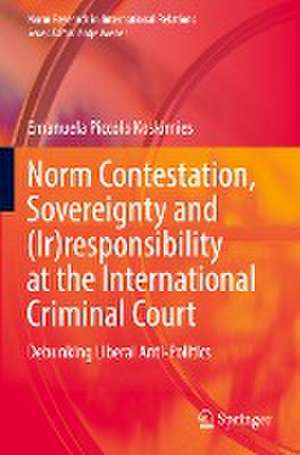Norm Contestation, Sovereignty and (Ir)responsibility at the International Criminal Court: Debunking Liberal Anti-Politics: Norm Research in International Relations
Autor Emanuela Piccolo Koskimiesen Limba Engleză Paperback – 28 oct 2022
| Toate formatele și edițiile | Preț | Express |
|---|---|---|
| Paperback (1) | 690.62 lei 6-8 săpt. | |
| Springer International Publishing – 28 oct 2022 | 690.62 lei 6-8 săpt. | |
| Hardback (1) | 696.68 lei 6-8 săpt. | |
| Springer International Publishing – 27 oct 2021 | 696.68 lei 6-8 săpt. |
Preț: 690.62 lei
Preț vechi: 812.49 lei
-15% Nou
Puncte Express: 1036
Preț estimativ în valută:
132.16€ • 136.54$ • 109.94£
132.16€ • 136.54$ • 109.94£
Carte tipărită la comandă
Livrare economică 20 martie-03 aprilie
Preluare comenzi: 021 569.72.76
Specificații
ISBN-13: 9783030859367
ISBN-10: 3030859363
Pagini: 153
Ilustrații: XIII, 153 p. 2 illus., 1 illus. in color.
Dimensiuni: 155 x 235 mm
Greutate: 0.25 kg
Ediția:1st ed. 2022
Editura: Springer International Publishing
Colecția Springer
Seria Norm Research in International Relations
Locul publicării:Cham, Switzerland
ISBN-10: 3030859363
Pagini: 153
Ilustrații: XIII, 153 p. 2 illus., 1 illus. in color.
Dimensiuni: 155 x 235 mm
Greutate: 0.25 kg
Ediția:1st ed. 2022
Editura: Springer International Publishing
Colecția Springer
Seria Norm Research in International Relations
Locul publicării:Cham, Switzerland
Cuprins
Chapter 1. Introduction. Beyond the Practice-Norm Gap.- Chapter 2. Sovereignty and the Life-Cycle of Norms Revisited.- Chapter 3. Shaping Sovereignty as Responsibility at the ICC (Part I): The Rome Statute.- Chapter 4. Shaping Sovereignty as Responsibility at the ICC (Part II): The Test of Institutional Practice.- Chapter 5. Conclusions. Irresponsible Sovereignty: A Dead-End?
Recenzii
“This book asks whether, and to what extent, the International Criminal Court (ICC) strengthens what several commentators herald as a transition towards a regime of ‘sovereignty as responsibility’. … As such, it will be of interest to a broad range of audiences, including those working in International Relations and international political theory, the emergence of norms and the inner workings of international organizations.” (Erna Burai, International Affairs, Vol. 99 (4), 2023)
Notă biografică
Textul de pe ultima copertă
Grappling specifically with the norm of sovereignty as responsibility, the book seeks to advance a critical constructivist understanding of norm development in international society, as opposed to the conventional – or liberal – constructivist (mis)understanding that still dominates the debate. Against this backdrop, the book delves into the institutionalization of sovereignty as responsibility within the lived practice of the International Criminal Court (ICC). More to the point, the proposed exploration intends to revive questions about the power-laden nature of the normative fabric of international society, its dis-symmetries, and its outright hierarchies, in order to devise an original framework to operationalize research on how – institutional – practice impinges on norm development. To this end, the book resorts to an original creole vocabulary, which combines the contributions of post-positivist constructivist scholars with the legacy of key post-modernist thinkers such as Michel Foucault and Jacques Derrida, as well as critical approaches to International (Criminal) Law and Post-Colonial Studies. The book will appeal to scholars of international relations and international law, in addition to critical scholars more broadly, as well as to practitioners in the fields of human rights and international justice interested in normative theory and the implementation and contestation of international social norms.
Caracteristici
Offers critical research on international social norms Explores the institutionalization of sovereignty as responsibility in and through the lived practice of the ICC Revives discussions about the power-laden nature of the normative fabric of international society




